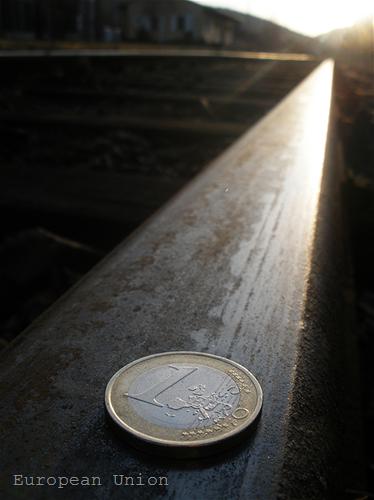Low-debt countries are now the latest fashion
Adelina Marini, November 23, 2010
 The problem with debt - both private and public - lies in the foundation of the global crisis and the unsustainable economic recovery. This is one of the conclusions in the analysis of Dr Constantin Vayenas, Head of the Emerging Markets Research department at the UBS, who was in Sofia at the invitation of the Atlantic Club Bulgaria. A curious detail is, given what you will read below, that Dr Vayenas is Greek. Separately from the problem that led to the crisis, is also the way governments around the world are trying to tackle it.
The problem with debt - both private and public - lies in the foundation of the global crisis and the unsustainable economic recovery. This is one of the conclusions in the analysis of Dr Constantin Vayenas, Head of the Emerging Markets Research department at the UBS, who was in Sofia at the invitation of the Atlantic Club Bulgaria. A curious detail is, given what you will read below, that Dr Vayenas is Greek. Separately from the problem that led to the crisis, is also the way governments around the world are trying to tackle it.
The real-estate market crisis
In order to better explain his thesis, Dr Vayenas went far back to the beginning, recalling the source of the crisis - the real-estate market in the United States. After reviewing the US model of economic development, he concluded that something in this model was broken. And it is that American banks used to lend too much credit to people who do not offer any other collateral (guarantees) than the house they were buying. And when the housing prices fall, everyone loses. Based upon these considerations, Constantin Vayenas divided the world into two parts - one part of the world is desperately trying to restart its real-estate market and to increase housing prices, while the other is doing exactly the opposite - lowering housing prices. The first part comprises most of all of the US and some countries in Europe, among which Bulgaria too, and in the second part are most of the Asian countries, led by China.
Fiscal policies
It was the approach to solving this issue that proved to be a very interesting part in Dr Vayenas's presentation. He gave an example of the heating of Japan's real-estate market more than a decade ago, to which the Japanese central bank responded with a 10-year delay by printing more money. Unlike the Japanese, the Americans quickly felt the overheating in December 2006 and it took them 18 months in order the Federal Reserve to start printing money in order to try and cool the economy down. An interesting focus the analyst put on Europe:
"At the time of the crisis the level of money (the level of euros) that were printed in the economy was basically similar to the US economy and there we see that the ECB, watching CNN I presume, reckoned there was something serious happening in America. The Americans are printing money, we should also perhaps try something". The big difference, according to the analyst is that there are only two people in the US who can decide how much dollars to be printed - the governor of the American central bank Ben Bernanke and the Treasury secretary Tim Geithner. "These two people can meet around the breakfast table and decide how many dollars to print and in the ECB the process is far more complicated - you have a large committee of people and the machine that prints the euros is not even known to the Greeks. If you know where the machine is, you should let them know, because they would like to get their hands on to it".
And another interesting explanation - why the euro still is much stronger in spite  of the severe crisis in the euro area? "It is simply that investors are betting that the Americans are not afraid and are gonna be more experimental and are gonna print more till they restart their economy. The Americans will do more and will act more aggressively than the Europeans", the UBS analyst said.
of the severe crisis in the euro area? "It is simply that investors are betting that the Americans are not afraid and are gonna be more experimental and are gonna print more till they restart their economy. The Americans will do more and will act more aggressively than the Europeans", the UBS analyst said.
How can the dissolution of the eurozone happen?
As striking as it might be, this question has been considered by analysts around the world, since the outbreak of the Greek crisis in spring this year. Three are the options that Dr Vayenas sees. The first is the least possible of all - to follow the American model, according to which the federal government takes money from rich states (like Texas), redistributes it through the budget and gives it to poorer states (like Alabama). "That helps the US currency union survive - money is transferred across the states. That is not an option for the eurozone because European investors in northern Europe and elsewhere are not interested in paying the pensions and social security of other eurozone member states", the analyst added.
The second option is the poor members of the monetary union to be kicked out. The problem here is that there is no clause in any of EU's treaties that could allow such an option. The only way is if a country would voluntarily leave the euro area, "and I think countries such as Greece will be one of the last countries to leave the eurozone, so the chance of that happening is extremely slim". And the third option is "the strong countries - Germany and its friends leave the eurozone and leave Greece and the other members have the pleasure of being in the eurozone, in which case Germany reintroduces the Deutsch Mark", the expert explained. At this stage, however, he forecast, the situation would remain the same for a long time.
Debt to GDP ratio
According to the UBS's analysis, emerging markets today are in a much better situation in terms of debt to GDP ratio. This is so, Constantin Vayenas claims, because emerging markets have gone through many crises, hyperinflation, banks crisis or even through sovereign default. He gave couple of examples, mentioning Bulgaria too. In 1974 Chile had 800% hyperinflation and now the country is well aware what it means for the government not to be able to pay its bills. Russia, aside from going through hyperinflation, it also had a sovereign default recently. Bulgaria also remembers its 1997 crisis with hyperinflation and a banking crisis.
Mentioning Bulgaria, Dr Vayenas drew quite a rosy picture, although he talked only about the debt to GDP ratio which tells a lot but not everything. Here is how he explained the situation with less than 17% public debt of our country: "Bulgaria is with debt to GDP ratio of just below 17%, which means that Bulgaria lies between Russia and China, which means that Bulgaria is in an extremely strong, enviable position as far as government debt is concerned. So, if there are complains and unhappiness about the economic situation in Bulgaria today, can you imagine the situation in Bulgaria if the Bulgarian government was as indebted as the Greek government - you would be in a very severe situation. But the fact is that your government has lived within its means and relative to the rest of the world today, because of the previous crisis that Bulgaria had, because of the lessons that Bulgaria learned in previous years, the state is able to pay its bills".
 That Bulgaria can pay its debt is a fact. But it is also a fact that what Bulgaria still has not learned yet is how to optimise its spending in such a way so that it could boost economic growth and pile wealth up. Because the example of Russia, as presented by the analyst with the UBS, is that the country benefited from the high oil prices two years ago in order to save money and currently it can afford not just paying off all its debts but it will still have cash left. Bulgaria also has a cash reserve which, however, the government is slowly spending without creating preconditions for restoration of what had been taken so far or to avoid the need of touching the reserve.
That Bulgaria can pay its debt is a fact. But it is also a fact that what Bulgaria still has not learned yet is how to optimise its spending in such a way so that it could boost economic growth and pile wealth up. Because the example of Russia, as presented by the analyst with the UBS, is that the country benefited from the high oil prices two years ago in order to save money and currently it can afford not just paying off all its debts but it will still have cash left. Bulgaria also has a cash reserve which, however, the government is slowly spending without creating preconditions for restoration of what had been taken so far or to avoid the need of touching the reserve.
Debt is out of fashion now
And as mentioned in the beginning, the main conclusion is that debt is the biggest problem after the crisis. Before it, debt was being perceived as good and safe, but now this is not the case. "So, before this crisis one would have assumed that countries with a triple A level - the debt issued by the US government, the debt issued by the French government, the debt issued by British government - was considered safe and solid and today investors are not quite so sure that these countries really are triple A, are they really so safe, are they really able to pay. Why? Because they have borrowed too much. And investors now have started looking more at countries that have low levels of indebtedness".
An interesting explanation Dr Vayenas gave for the situation in Ireland at the moment, which again heated up the markets and forced the euro area to dig in its pockets once again. According to him, the interest rates in Ireland are the same as in Germany for the simple reason that both countries have the same central bank [the European Central Bank]. "The Germans stopped borrowing at 100% of GDP, this is private credit, but the Irish continued to build pyramids throughout the country, they borrowed money and the result is this very high level of private debt". In this context the expert reassured that in Bulgaria the situation is still stable because interest rates are around 4% and the level of private debt is around 78% of GDP.
Looking for the golden middle
In fact, we can derive one more conclusion from the crisis, of which euinside has  written many times - the imbalances in almost the entirely globalised economy, which led to the need of undertaking measures, aimed at avoiding involving the world in a deeper crisis. Such an attempt the Group of Twenty leading nations made at their summit in Seoul earlier in November. Even before the summit, however, the calls for reforming the global monetary system increased and the president of the World Bank Group Robert Zoellick even suggested the return to the gold standard (securing national currencies with gold and not with capabilities as it is now).
written many times - the imbalances in almost the entirely globalised economy, which led to the need of undertaking measures, aimed at avoiding involving the world in a deeper crisis. Such an attempt the Group of Twenty leading nations made at their summit in Seoul earlier in November. Even before the summit, however, the calls for reforming the global monetary system increased and the president of the World Bank Group Robert Zoellick even suggested the return to the gold standard (securing national currencies with gold and not with capabilities as it is now).
The calls for a change of the monetary system were caused by the loss of confidence of investors in the currencies of big and strong nations. However, as Dr Vayenas explained responding to a question of euinside, the return to the gold standard is impossible: "It is interesting how in times of crisis we open the history books again and try to find out what did they do better in those days. The problem with the gold standard is that there is not enough gold. If you want to go back to the gold standard, the gold price would have to reach ten thousand dollars to balance the output that we have and that is not likely to happen".
The French president Nicolas Sarkozy who took over the G20 presidency for the next one year, promised to find a way to reform the monetary system. So far, there is no solution to the current problems.
 | © European Union
| © European Union | © European Union
| © European Union | © European Union
| © European Union